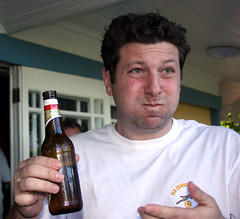Rick Johnson elected to Hall of Fame
 Rick Johnson has been elected to the OCCC Hall of Fame in recognition of his huge contribution to the club. He becomes the 11th inductee.
Rick Johnson has been elected to the OCCC Hall of Fame in recognition of his huge contribution to the club. He becomes the 11th inductee.“The Hall of Fame is a good idea and I am flattered to have been elected,” the stout Johnson said. “I hope I can continue to offer something back to OCCC as it has given me more pleasure than Melissa.”
“Rick has been instrumental in taking the club to a new level, starting with the first tour to Antigua in 1997,” said Martin Williamson. “His sheer energy and enthusiasm is infectious, if on occasion utterly misguided, and he is much of the reason the OCCC is regarded with envy by almost all old boys’ sides.”
After a chequered career at Cranleigh both on and off the pitch, Johnson made his OCCC debut in 1991 and in 89 matches has scored more than 2000 runs at 34, including two hundreds. Had he actually enjoyed playing cricket his record would have been far better. His batting style remains uncompromising, relying on a good eye and the absence of a third man, and on his day he can be entertaining to watch.
For a time he also kept wicket before physical difficulties (he couldn’t bend down) forced him to re-evaluate his role.
But his real contribution has been off the pitch – somewhere he much prefers to be rather than actually playing – where he has been the lynchpin behind many OC tours, was the driving force of the Jubilee pavilion refurbishment, and has orchestrated more loss-making BBQs than any man in history.
In more recent years he had a spell as a Cranleigh governor and is currently involved in a number of ambitious projects. In his free time he has taken over Cranleigh CC and still finds time to occasionally fly for BA.
Labels: Hall of Fame, Rick Johnson







